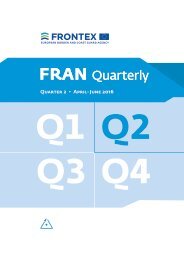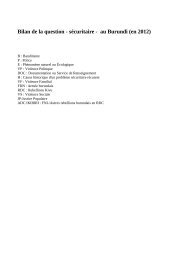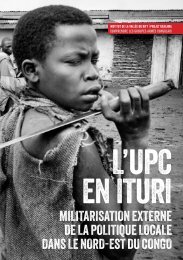Create successful ePaper yourself
Turn your PDF publications into a flip-book with our unique Google optimized e-Paper software.
BOKO HARAM<br />
The long-term follow-on challenge, as stated by Paul Cobaugh of Narrative<br />
Strategies, is the prospect that even if we defeat IS militarily, we’ll still<br />
lose the war against extremist Islamic ideology because its adherents view<br />
the conflict as a holy war; in this jihadist ideology, we are killing Muslims<br />
defending their faith. If we don’t employ our own narrative that explains the<br />
fight in our own, credible terms, we leave the narrative battlefield with the<br />
extremists uncontested.<br />
Dr. Ajit Maan, the president of Narrative Strategies, recently stated that<br />
if we do not plan for the defeat of IS and, physically and ideologically, for<br />
the transition to stability, one extremist organization will replace another<br />
until the population’s legitimate problems are addressed; but that will take<br />
time, and we have to be able to seize opportunities when they arise. Our<br />
narrative shouldn’t “counter” a particular group but should offer an alternative<br />
future and vision that can be touched, seen, and heard simultaneously<br />
on the ground.<br />
So, for the Islamic State overall, the challenge for strategists and policy<br />
writers is to plan and coordinate the strategic win, encourage people to envision<br />
an end to IS, and plan a replacement reality so that a new group does<br />
not fill the gap. This will help strategists and narrative managers visualize<br />
the group as a temporary thing, as opposed to a problem we will struggle<br />
with forever. Seeing an end to IS ensures we do not build a dependence on<br />
the terrorist group’s long-term existence that will translate to a future lack of<br />
response when a more nimble, more deadly group emerges.<br />
For the future, I recommend three actions, detailed below. The first is for<br />
intelligence, the second is for security, and the third involves ideology:<br />
• Expansion of intelligence-community research into both single threat<br />
indicators and cluster indicators for mapping networks and spotting<br />
potential threats.<br />
• Expansion of security forces from observation and interdiction to<br />
include outreach and direct negotiation with at-risk people or groups.<br />
German security forces exemplify this approach by contacting a person<br />
before he or she becomes a threat to the public. Through this outreach,<br />
potential perpetrators learn that they are under watch for possible terrorism<br />
involvement and concomitantly learn their options. Such outreach<br />
by security forces drives away the threat before it can culminate in an<br />
actual strike.<br />
73






